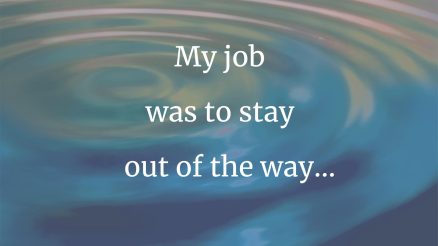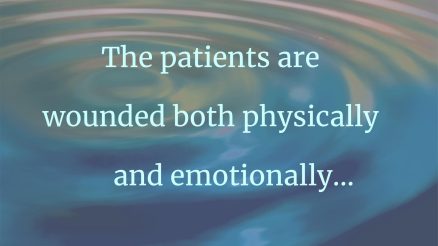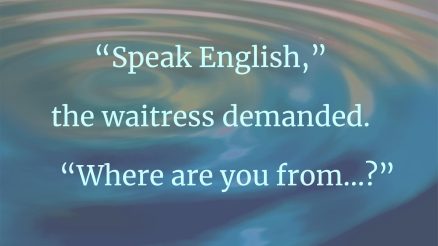- Home
- /
- Stories
Stories

Chameleon
Editor’s Note: This piece was awarded an honorable mention in the Pulse writing contest, “On Being Different.”
On my first day of kindergarten, in Little Rock, Arkansas, I discovered that I was different. All of my classmates had experienced their first day of school together in August, but I didn’t turn five until after Labor Day, so my first day of school, in September, came coupled with being the new girl in class.
Also, for the first time in my life, someone asked me a question that would follow me, in various forms, for the rest of my life:
“Are you Black or white?”

The VIP
It was late at night, and as the neurosurgery resident on call, I was alone in the hospital, wishing that I could lie down, or even just slow down, in the midst of a busy shift.
I sat for a moment, awaiting the inevitable next phone call or text. Predictably, my phone rang within minutes. It was the trauma-team resident.

Don’t Ever Let Them Break You
Editor’s Note: This piece was awarded an honorable mention in the Pulse writing contest, “On Being Different.”
I was a woman in medical school before there were more women students than men—back when women were expected to be more masculine than the men if they wanted to succeed as doctors, back when the idea that we could report our medical-school professors for sexual harassment was just a twinkle in the eye of someone braver and less conflict-avoidant than I was.

Cherish the Gift
It was a perfect autumn day in St. Petersburg, Florida. The year was 1999, but I still remember that day’s sparkly blue sky. I was driving down a busy street, peering at the signs to locate my destination. Finally I spotted the nursing home, a two-story concrete structure, grey and uninviting. I took a deep breath, parked and walked to the entrance.
Entering the small lobby, I was overwhelmed by the nauseating smell of stale urine. To reach the front desk, I had to weave through a jumble of wheelchairs, some holding slouched bodies, others supporting patients who called out and reached to touch me as I walked by.

His Mother’s Son
Editor’s Note: This piece was awarded an honorable mention in the Pulse writing contest, “On Being Different.”
On a crisp Saturday morning in October, I drove through the early morning fog to the salon for my regular hair-coloring appointment.
I looked forward to these appointments. The hour spent there was my “me” time, during which I enjoyed lighthearted conversations with my colorist, Tina, about movies or fashion while she did my hair. These chats, which took me to a different world—the world of normal people—were followed by a cup of rejuvenating herbal tea. After a hard week as an oncologist in a busy clinic, it was a welcome relief.
This time was different, however.

Disposable
As a third-year medical student, I was two weeks into my trauma-surgery rotation when my resident casually called me “disposable.” I wasn’t offended—in fact, the word perfectly described how I’d been feeling. I also understood that it was no reflection on my performance; rather, it was a commentary on medical students in general.
Surgery was the first rotation of my third year—and, now that the COVID pandemic was winding down, it was also my first in-person clinical rotation.
I’d never been on the floors of the hospital. I felt clueless, underprepared and incompetent.

Scenes From an Emergency Room–October 7, 2023
Editor’s Note: Today we carry a submission received from an Israeli child-and-adolescent psychiatrist who works at Soroka Medical Center, about twenty-five miles from the Gaza Strip. In this account (translated by colleague Jennie Goldstein), Hadar Sadeh describes her experiences dealing with victims of violent trauma on October 7. As events have unfolded, we at Pulse are acutely aware that many stories on both sides of this conflict need to be told.

Fear of Flesh
Sometimes I wish that skin and bones didn’t exist. Of course, that would be impossible—the skeleton is the scaffold for our bodies, while the skin is the insulation for vital organs such as the heart, kidneys and bowels. Without our skin and bones, we’d be mere piles of goo on the floor.
Bones are too complicated, for the simple reason that there are too many. As a first-year medical student studying anatomy, I agonized over learning the grooves and prominences where the muscles originate and insert into the bones. I always struggled to find these so-called bony landmarks on our simulated patients.
And flesh…the skin is even more horrifying than the bones beneath it.

The Genesis of Forgetfulness: A Poet’s Journey
“The poet’s job is to translate unspeakable things on to the page…” – Roger Robinson
In the beginning, the Lebanese civil war barely seeped through the ceiling of our living room. It didn’t shatter windows or infiltrate through cracked walls. It became a slow fixture at our dinner table, nibbled on Mama’s delicately wrapped grape leaves, inhaled Father’s unfiltered cigarettes, listened to my older brother practice scale after scale on the upright piano and sat on the Persian carpet with my younger brother to rearrange his Matchbox cars. In our Armenian family of five, the war felt mute—a sixth character without words, an unobtrusive intruder who was given permanent residency.
